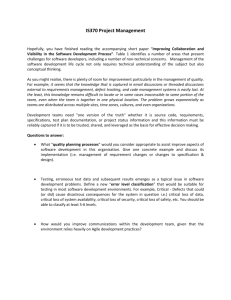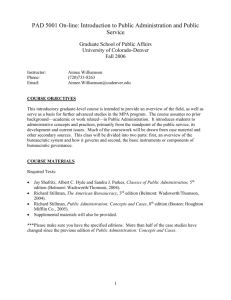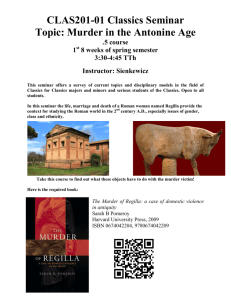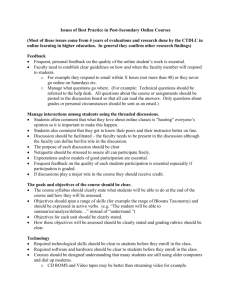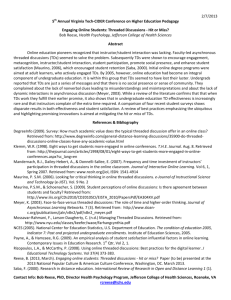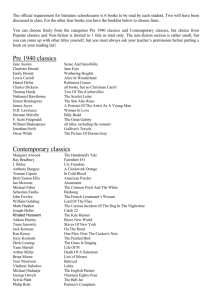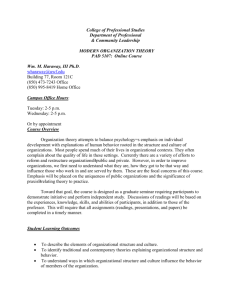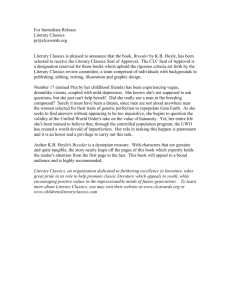PAD5001-OL1 Williamson - University of Colorado Denver
advertisement
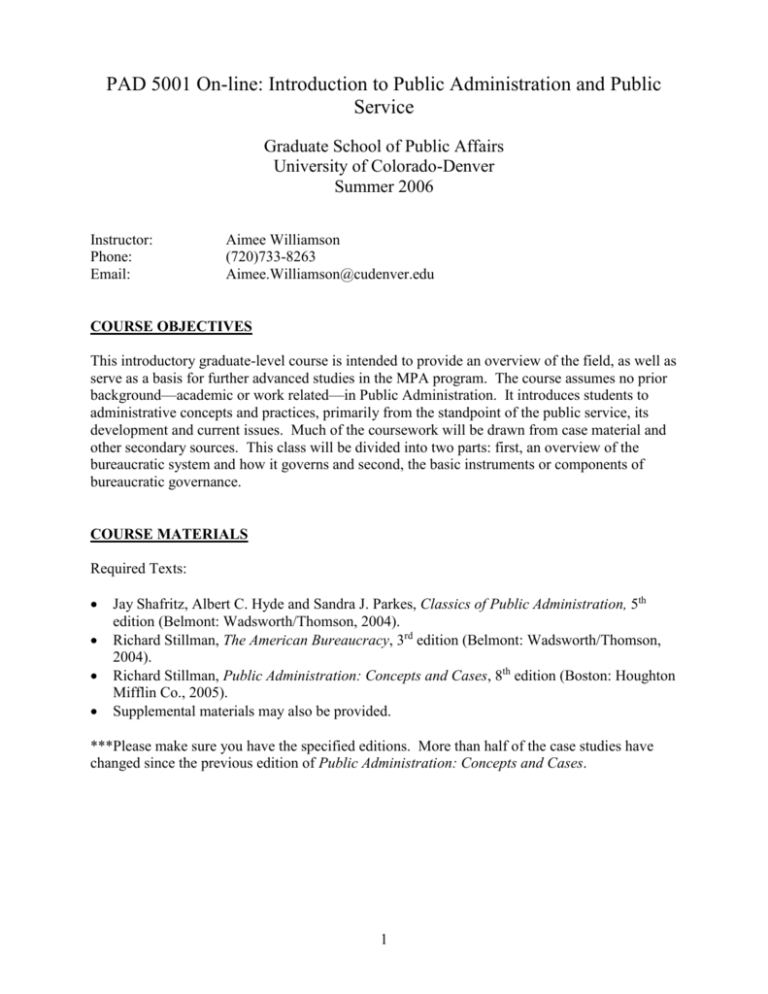
PAD 5001 On-line: Introduction to Public Administration and Public Service Graduate School of Public Affairs University of Colorado-Denver Summer 2006 Instructor: Phone: Email: Aimee Williamson (720)733-8263 Aimee.Williamson@cudenver.edu COURSE OBJECTIVES This introductory graduate-level course is intended to provide an overview of the field, as well as serve as a basis for further advanced studies in the MPA program. The course assumes no prior background—academic or work related—in Public Administration. It introduces students to administrative concepts and practices, primarily from the standpoint of the public service, its development and current issues. Much of the coursework will be drawn from case material and other secondary sources. This class will be divided into two parts: first, an overview of the bureaucratic system and how it governs and second, the basic instruments or components of bureaucratic governance. COURSE MATERIALS Required Texts: Jay Shafritz, Albert C. Hyde and Sandra J. Parkes, Classics of Public Administration, 5th edition (Belmont: Wadsworth/Thomson, 2004). Richard Stillman, The American Bureaucracy, 3rd edition (Belmont: Wadsworth/Thomson, 2004). Richard Stillman, Public Administration: Concepts and Cases, 8th edition (Boston: Houghton Mifflin Co., 2005). Supplemental materials may also be provided. ***Please make sure you have the specified editions. More than half of the case studies have changed since the previous edition of Public Administration: Concepts and Cases. 1 REQUIREMENTS This on-line section of Introduction to Public Administration and Public Service is made up of nine units. Each unit will last one week (although note that units 5 and 6 will overlap one day to provide a one day extension for the Fourth of July holiday) and will be devoted to discussion and analysis of the topics indicated. Students are expected to read the required materials and participate during each unit. The ninth unit will be for the final exam. Each unit will “open” at least one week prior to its beginning date. The course has been set up this way to allow some flexibility for those traveling during the summer. I strongly encourage everyone to check the course regularly and participate in the threaded discussions in a timely and responsive manner. However, if you will be “absent” for a week, the course will be open the week before to give you a chance to participate in advance. Also, remember that you are only required to participate in 7 of the 8 threaded discussions. Please let me know if you do have plans to be out of town (or unable to access the course) during any of the units and I will take this into account when setting up the threaded discussion groups. Reading Assignments Plan to complete the readings within the first few days of each unit. The supplemental readings are optional. Generally, they provide a more recent application of the material discussed in the unit. You may certainly discuss these readings during the threaded discussions, as well as use them as references during the final exam. Threaded Discussions (25 points) For each unit, you are expected to participate in the threaded discussion and will be graded on this activity. The discussion questions for each unit will be found under each unit heading and will be labeled “discussion.” The first unit will be a “practice” threaded discussion (everyone will get one point just for posting). After that, participation will be graded based on both content and online participation skills. Also after the first unit, I will break up the class into smaller groups for threaded discussions. You will post your comments and respond to other students within your smaller discussion group. Each threaded discussion (after Unit One) will be worth 4 points, based on the following: Content Assessment Skills: 2 points: Demonstrates excellence in grasping the key concepts; critiques work of others based on application of knowledge from resources (not just personal opinion); offers new interpretations of discussion materials. 1 point: Shows evidence of understanding key concepts; is able to show basic level of support for opinions. Online Participation Skills: 2 points: Contribution is prompt, thoughtfully worded, and relevant; remarks are posted frequently responding to other students. 1 point: Student responds to at least one student thoughtfully and within the unit time frame. 2 You are expected to participate in 7 of the 8 threaded discussions (including the first unit’s one point “practice,” for a possible total of 25 points. If you participate in every threaded discussion, your lowest participation grade will be dropped (even if it is a 0). No points will be awarded for postings made after the due date indicated in the course schedule. Keep in mind that the summer is a condensed semester and in-class courses generally meet twice as often (or for twice as long) as they do in other semesters. I’ve set up “completion dates” for the readings several days before the end of each unit to give students ample time to participate in the threaded discussions after completing the reading assignments. Research Paper (35 points) You are also required to submit one research paper, on a topic related to one of the units in this course. You may choose a topic of interest, with the instructor’s approval. The paper should be 3,000-4,000 words in length. I encourage students to e-mail me with their choice of topic as soon as possible, but at least by the end of Unit Three (June 20th). The research paper will be due at the end of Unit 6, by midnight, Tuesday, July 11th. Final Exam (40 points) The final exam will be given during Unit 9 (July 26- August 1). The final exam must be completed by midnight, Tuesday, August 1st. EVALUATION Grades will be based on the following: Possible Points Threaded Discussion 25 points Research Paper 35 points Final Exam 40 points 100 points Grading Scale A AB+ B BC+ C CD+ D 93-100 points 90-92 points 87-89 points 83-86 points 80-82 points 77-79 points 73-76 points 70-72 points 67-69 points 63-66 points 3 DF 60-62 points Under 60 points Academic Honesty Students are expected to be aware of and abide by the Academic Honor Code of the University of Colorado at Denver. You can access these policies at: http://www.cudenver.edu/Academics/Catalog0506/RegPolicies/default.htm. Click on “Academic Policies, Regulations.” Exams must be completed individually, without assistance from other students. Plagiarism will not be tolerated in any written work. The CU-Denver catalog defines plagiarism as the “use of another person’s distinctive ideas or words without acknowledgement.” ADDITIONAL INFORMATION Students are encouraged to contact the instructor with any questions or concerns about this course. I am happy to meet with students, talk to students by phone, or respond to questions by e-mail. If this is your first online class, I recommend that you review the “student orientation course” on e-college. If you are having difficulty accessing any of the material, please let me know. If you have technical problems with e-college, you can reach their 24 hour help desk at 303-873-0005 or HelpDesk@cuonline.edu. COURSE SCHEDULE UNIT ONE May 31-June 6 Overview of Public Administration Reading Assignment: Complete by June 3rd. Public Administration: Concepts and Cases: Chapter One (pp. 1-47) “Toward a Feminist Perspective in Public Administration Theory,” Camilla Stivers (Classics of Public Administration, pp 477-486) Written Assignments: Due by June 6th. Introduce yourself to the class in the “Introductions” section of Unit One. Participation in Threaded Discussion for Unit One (“practice” threaded discussion, worth one point). UNIT TWO June 7-13 The American Bureaucracy Reading Assignment: Complete by June 10th. The American Bureaucracy: Chapters One, Two, and Seven (pp.1-76, 316-350) “Bureaucracy,” Max Weber (Classics of Public Administration, pp. 50-55). 4 Written Assignment: Due by June 13th. Participation in Threaded Discussion for Unit Two. UNIT THREE June 14-20 Politics and Administration Reading Assignment: Complete by June 17th. Public Administration: Concepts and Cases: Chapter Four (pp.104-123) “Politics and Administration”, Frank Goodnow (Classics of Public Administration, pp. 35-37) “Administrative Decentralization and Power, Herbert Kaufman (Classics of Public Administration, pp. 285-297) “Public Administration Theory and the Separation of Powers,” David Rosenbloom (Classics of Public Administration, pp. 446-457) Written Assignments: Due by June 20th. Participation in Threaded Discussion for Unit Three. E-mail me with your research paper topic. UNIT FOUR June 21-27 Organizational Theory Reading Assignment: Complete by June 24th. Public Administration: Concepts and Cases: Chapter Six (pp.154-178) “Scientific Management,” FrederickTaylor (Classics of Public Administration, pp. 4345) “Notes on the Theory of Organization,” Luther Gulick (Classics of Public Administration, pp. 90-98) “The Proverbs of Administration,” Herbert Simon (Classics of Public Administration, pp. 136-149). Written Assignments: Due by June 27th. Participation in Threaded Discussion for Unit Four UNIT FIVE June 28-July 5 Public Management Reading Assignment: Complete by July 1st. Public Administration: Concepts and Cases: Chapter Ten (pp. 298-339) “Public and Private Management: Are They Fundamentally Alike in All Unimportant Respects?” Graham Allison (Classics of Public Administration, pp. 396-413). “Exploring the Limits of Privatization,” Ronald Moe (Classics of Public Administration, pp. 467-476). “A Public Management for All Seasons?” Christopher Hood (Classics of Public Administration, pp. 503-516). Written Assignment: Due by July 5th. 5 Participation in Threaded Discussion for Unit Five UNIT SIX July 5- 11 Human Resource Management Reading Assignment: Complete by July 8th. Public Administration: Concepts and Cases: Chapter Eleven (pp. 340-364) “Democracy and the Public Service: The Collective Services,” Frederick Mosher (Classics of Public Administration, pp. 434-445) “From Affirmative Action to Affirmative Diversity,” R. Roosevelt Thomas, Jr. (Classics of Public Administration, pp. 494-502) Written Assignment: Due by July 11th. Participation in Threaded Discussion for Unit Six Research Paper Due UNIT SEVEN July 12- 18 The Policy Process Reading Assignment: Complete by July 15th. Public Administration: Concepts and Cases: Chapter Eight (pp. 220-253) “The End of Liberalism: The Indictment,” Theodore Lowi (Classics of Public Administration, pp. 298-301) “Policy Paradox: The Art of Political Decision Making,” Deborah Stone (Classics of Public Administration, pp. 571-577). Written Assignment: Due by July 18th. Participation in Threaded Discussion for Unit Seven UNIT EIGHT July 19-25 Ethics and the Public Service Reading Assignment: Complete by July 22nd. Public Administration: Concepts and Cases: Chapter Sixteen (pp. 501-527) “The Possibility of Administrative Ethics,” Dennis Thompson (Classics of Public Administration, pp. 458-466) Written Assignment: Due by July 25th. Participation in Threaded Discussion for Unit Eight UNIT NINE July 26- August 1 Final Exam Written Assignment: Final Exam, due by midnight, Tuesday, August 1st ***Please note that this is a tentative schedule and may change if necessary during the course. 6 7
